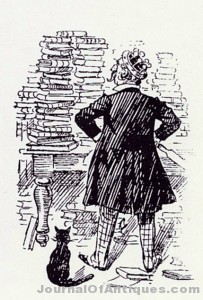To Buy or Not to Buy, That is the Question
Collecting Old and Rare Books
by James Dawson

Why do we collect books or anything else for that matter? Not everyone is a collector, of course, but I’d bet that there have been collectors ever since there have been things to collect. Probably some caveman’s kid collected shiny pebbles.
Sometimes collecting is an attempt to recapture things from your childhood or youth. I can’t tell you how many times I heard a customer say that they were buying Hardy boys or Nancy Drew books or other items they had because their mother threw them out. Mothers seem to like to do that. Actually, when you think of it, many items are now rare and valuable simply because so many mothers threw so many of them away. Yet, if every childhood book and toy been saved, they would be everywhere and not valuable.
Yet it is not always easy to tell what a collectable will be worth years from now. One example of this is that so many people saved Kennedy assassination newspapers and magazines with the result that they are everywhere and usually not worth much.
If you are collecting as an investment somehow you’d need to figure out something interesting that is available now that no one now would think to save, but which would be valuable sometime in the future. There is no formula for that, so you are on your own. The only thing I can suggest for that is not to buy something that everyone else is buying because sooner or later it will probably all go bust.
Of course the best thing is to collect something purely because it gives you enjoyment and not as something to make money on later. This way you can not go too far wrong, and if it does turn out that it is worth more when you do decide to sell, then that’s like having your cake and eating it, too.
There is no denying that nostalgia is a powerful force in the collecting world and can drive up prices for rare items to the stratosphere. Yet much of this is generational and based on first hand personal experiences of that particular generation of collectors which may or may not be shared by later generations of collectors who say did not go to see Liz Taylor in the movie Cleopatra when it first came out or go to an Elvis Presley concert or eagerly await his next record.
Not to pick on Liz and Elvis, I am just using them as examples. Of course, we will always have their films and recordings and admire their talents, but that probably won’t awaken the same passions in later generations of collectors who did not grow up with them. And who but historians remember Sarah Bernhardt who, in the 1890s, was called the most famous actress the world has ever known? Sarah who? Will Elizabeth Taylor someday be the Sarah Bernhardt and Elvis Presley the Rudie Vallee of their day? I know they both still have their own websites (including Sarah!), but I’d guess that their popularity has peaked and, sooner or later, they will become a distant memory. Hey, I’m glad she is on the web, just don’t expect any Sarah Bernhardt fast food franchises to open up.
Roy Rogers was a huge cowboy star in the 1950s who did films and had his own TV show. There was even a Roy Rogers museum which was well attended for years, but it closed recently. Why? It was well attended by the first generation of Roy Rogers fans who took their own kids to it. But when those kids grew up and had their own kids Rogers’ posthumous career faded away into the sunset. Not many kids care what their grandfathers watched on a tiny black and white TV eons ago and if there is not a new generation of collectors to carry on, stars like ole’ Roy are going to be dead in the water, or rather the saddle.
So I guess my warning is, if you are collecting for investment, beware of nostalgic items that are over hyped by one generation only to be ignored by the next. But on the other hand if you really love Roy Rogers stuff, now would be the time to collect it. What I’m saying is, you can’t go wrong if you collect something because it gives you pleasure, just don’t collect stuff because other people are collecting it or because you are expecting Big Bucks from it when you sell.
Books don’t seem to be subject to that degree of nuttiness, yet, as a rule of thumb, I would guess that more often than not the best-selling authors of two or three generations ago usually turn into worst sellers. In the 1920s, collectors were paying very high prices for books by John Galsworthy. Now, you could say that John Galsworthy is the Roy Rogers of the book world, except that he never had a restaurant chain.
Edgar Rice Burroughs created one of the most successful characters ever. But while Tarzan the character is still instantly recognizable everywhere, I’d bet that young collectors know him now from the movies, cartoons and comic books, not from the actual books that Burroughs wrote beginning in 1912, over a century ago, the plots of which are probably dated. Time and tastes change even though, in this rare case, the character adapts for newer generations.
Some collectors collect for investment and pay big prices for rare stuff while others collect just for the fun of it and don’t care about value. In the good old days before the economy collapsed, collecting was great. For books and virtually everything else. You could literally have your cake and eat it too because when you or your heirs were ready to sell the items were probably worth much more than what you paid for them. What other activity could you spend money on, enjoy and then make your investment back and more so when you sold? But nowadays, in this economy, that may not be the case as it’s a buyers market for many things. But if you have the money and love the stuff, now is the time to buy.
Sometimes we collect for knowledge. I now have a serious Thoreau collection, but it started out when I was in school, became interested in the man, and needed more than what the local library could supply. At first, I deliberately collected cheap editions because I thought that would be in keeping with the man’s philosophy of keeping things simple and it was the information I wanted, not something rare.
Well, that changed a few years later when I became more knowledgeable about old books and first editions. By then, I wished that I had been more serious about it earlier on. First I collected so that I could have the information. I started collecting for the love of it and the thrill of the chase. Now, many years later I have first editions.
When I started my collection in the early 1970s, I had no idea that I would ever own a first edition of Walden. I didn’t know the first or second thing about rare books, let alone old books, so I would have scoffed that such a thing was even possible.
And those where the days when you could get a nice first edition of Walden for maybe $750 or so. I can still remember turning one down in a Concord, Mass. bookshop because 1. I had one already and 2. I thought it was too much money. Now, even in this economy it would be worth a couple thousand!
And, some years later when when I had become a bookseller, I passed up another first of Walden at an antiquarian book fair even though it was reasonably priced at about $650 because it had been rebound in the ugliest, modern, orange cloth binding that I had ever seen. It was hideous. The dealer still had it a year later at the next book fair there. I mean it was that U-G-L-Y.
So after I got home this next time I thought- duh!- I could have bought it, had it rebound in full leather and easily sold it at a profit. Normally, you shouldn’t rebind rare books, but since it had already lost its original cover in this case it didn’t matter. And anything I could have done would have been a welcomed improvement. Of course, when I went back the following year to buy it, it had finally sold which served me right for dawdling.
In each instance, I was guilty of too much short term thinking and not enough long term thinking. It’s not easy to predict the future. Even experienced dealers and collectors who should know, often don’t.





Related posts: